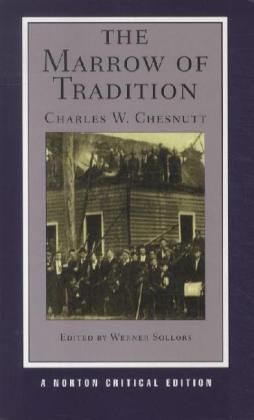Read more
Inspired by the 1898 Wilmington Riot and the eyewitness accounts of Charles W. Chesnutt's own family, Chesnutt's
The Marrow of Tradition captures the astonishing moment in American history when a violent coup d'état resulted in the subversion of a free and democratic election.
The Norton Critical Edition text is based on the 1901 first edition. It is accompanied by a note on the text, Werner Sollors's insightful introduction, explanatory annotations, and twenty-four photographs and illustrations.
"Contexts" connects the novel to the historical events in Wilmington and includes a wealth of newspaper articles, editorials, and biographical sketches of the central players.
The account of riot instigator Alfred Moore Waddell, published just weeks after the event, is reprinted, along with three rarely seen letters: W. E. B. Du Bois's and Booker T. Washington's comments on the novel and Walter Hines Page's letter to Chesnutt. Rounding out the historical record is a selection of 1890s sheet music, a poem, and newspaper articles on the Cakewalk, a popular dance of the period with roots in slavery.
"Criticism" begins with twelve contemporary reviews, including those by Hamilton Wright Mabie, Katherine Glover, William Dean Howells, and Sterling A. Brown. Fifteen recent assessments focus on the novel's characters, history, realism, and violence. As scholarship on
The Marrow of Tradition and on Wilmington in 1898 has been especially active since the 1990s, ten assessments are from this period.
A Chronology and Selected Bibliography are also included.
About the author
Charles W. Chesnutt was born in 1858 in Cleveland, Ohio. At the end of the Civil War, his parents returned to their native Fayetteville, North Carolina, where Charles attended a school run by the Freedmen's Bureau. After serving as principal of the State Colored Normal School from 1880 to 1883, he abandoned both his teaching career and a South that was increasingly hostile to African Americans. Moving back to Cleveland, he practiced law, established a successful legal stenography firm, and began pursuing a career as a writer. His first story, "Uncle Peter's House," about a newly emancipated Black family whose home is burned down by the Ku Klux Klan, appeared in 1885. It introduced the themes of folk life, racial injustice, and social reform that he would explore in dozens of short stories, essays, and three novels. By the time he died in 1932, Chesnutt was widely recognized as the dean of African American fiction writers.
Summary
The Norton Critical Edition of this hugely influential novel gives readers the fullest possible sense of its historical background and critical assessment.

